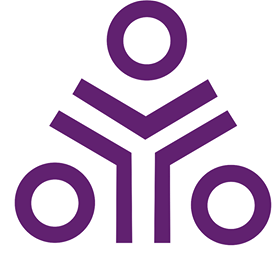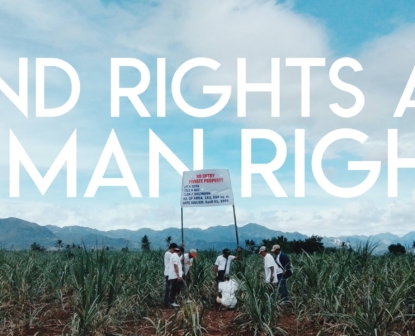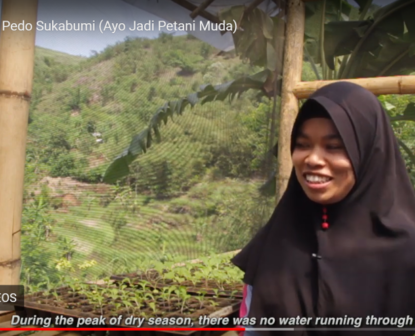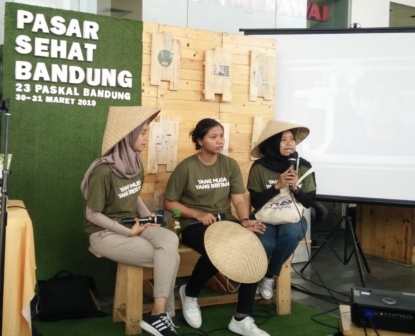Project
Let’s Be Young Farmers
-
Amount Funded
123,790 EUROProject Duration
01 Sep 2018 - 31 Aug 2020 -
-
Lead organisation
-
AKATIGA’s mission is to influence positive policy changes in order to create a fair social, political, and economic environment. This enables the poor and marginalised groups to acquire greater access and control over resources for sustainable livelihood. AKATIGA focuses on three core activities: research, policy influencing, and monitoring and evaluation in four priority issues which include Micro, small and Medium Enterprises, governance, rural youth employment, and agrarian areas.
AKATIGA’s research employs qualitative, quantitative, mix-methods, and critical analysis to produce robust research output. These have been translated into numerous reports, books, journals, paper works, policy papers, and popular writings published in national and international publications.
AKATIGA has an established experience and knowledge on the issue of youth, agriculture, and rural development. In 2015, they completed research in 12 villages in West Java, Central Java, and South Sulawesi to investigate a number of agricultural issues, including youth and employment. They found that one of the reasons of why young rural youth are moving away from agriculture is the problem of access to land. From 2016 onwards, AKATIGA has been working with universities and research institutes in Canada, China, India, and The Netherlands on the same issues under a four-country research project titled “Becoming Young Farmers: Young people’s pathways into farming”. In 2017, AKATIGA also completed a research project on youth migration in East Nusa Tenggara, investigating the pattern of internal youth migration.
In terms of advocacy, AKATIGA provides policy analysis and input for the revision of the Presidential Decree (Peraturan Presiden) on Procurement (Pengandaan Barang dan Jasa) PERPRES 54 Tahun 2010 and guided the revision process.
In addition, AKATIGA facilitates a number of learning activities, including with youth groups. Last year, they worked with the School of Semi Palar (High School) on the learning series on conducting social research in rural areas.
-
Organisation
AKATIGA’s mission is to influence positive policy changes in order to create a fair social, political, and economic environment. This enables the poor and marginalised groups to acquire greater access and control over resources for sustainable livelihood. AKATIGA focuses on three core activities: research, policy influencing, and monitoring and evaluation in four priority issues which include Micro, small and Medium Enterprises, governance, rural youth employment, and agrarian areas.
AKATIGA’s research employs qualitative, quantitative, mix-methods, and critical analysis to produce robust research output. These have been translated into numerous reports, books, journals, paper works, policy papers, and popular writings published in national and international publications.
AKATIGA has an established experience and knowledge on the issue of youth, agriculture, and rural development. In 2015, they completed research in 12 villages in West Java, Central Java, and South Sulawesi to investigate a number of agricultural issues, including youth and employment. They found that one of the reasons of why young rural youth are moving away from agriculture is the problem of access to land. From 2016 onwards, AKATIGA has been working with universities and research institutes in Canada, China, India, and The Netherlands on the same issues under a four-country research project titled “Becoming Young Farmers: Young people’s pathways into farming”. In 2017, AKATIGA also completed a research project on youth migration in East Nusa Tenggara, investigating the pattern of internal youth migration.
In terms of advocacy, AKATIGA provides policy analysis and input for the revision of the Presidential Decree (Peraturan Presiden) on Procurement (Pengandaan Barang dan Jasa) PERPRES 54 Tahun 2010 and guided the revision process.
In addition, AKATIGA facilitates a number of learning activities, including with youth groups. Last year, they worked with the School of Semi Palar (High School) on the learning series on conducting social research in rural areas.
-
Project
The project facilitates young marginalised groups (female and male) in rural areas of Central and West Java to access resources, knowledge, and skills to make farming their livelihood. This is done through:
1. Organising rural youth to pursue access to land owned by village government (e.g. tanah kemakmuran, tanah kas desa).
2. Facilitating youth to learn innovative methods in farming, including sustainable farming practices, product processing, and marketing. This makes farming attractive, economically beneficial, and environmentally sustainable.
3. Improving collective action capacities of rural youth to strengthen their political participation in government decision making processes.AKATIGA has identified two best practices run by two youth groups on innovative farming methods and practices. The project combines, modifies, and contextualises these practices. They are tested in two target youth groups in two villages. Contextualisation employs Participatory Action Research (PAR) methods where participants themselves are involved in assessments, testing, and evaluations. A learning process is facilitated between the two groups for knowledge transfer about each others farming practices.
AKATIGA closely studies and documents all processes using qualitative methods. Findings are published in online and offline platforms, tailoring the content in a way that can reach young audiences and inspire broader youth groups.
AKATIGA specifically targets three layers of impacts:
1. Two youth groups in two poor villages in Kebumen (Central Java) and Sukabumi (West Java) as the innovation sites;
2. The existing youth groups (models) in Kulon Progo and in Bandung;
3. Broader youth groups and NGOs who are involved in agriculture across the country that could benefit from knowing the innovation through various media platforms.
-
-
The project facilitates young marginalised groups (female and male) in rural areas of Central and West Java to access resources, knowledge, and skills to make farming their livelihood. This is done through:
1. Organising rural youth to pursue access to land owned by village government (e.g. tanah kemakmuran, tanah kas desa).
2. Facilitating youth to learn innovative methods in farming, including sustainable farming practices, product processing, and marketing. This makes farming attractive, economically beneficial, and environmentally sustainable.
3. Improving collective action capacities of rural youth to strengthen their political participation in government decision making processes.AKATIGA has identified two best practices run by two youth groups on innovative farming methods and practices. The project combines, modifies, and contextualises these practices. They are tested in two target youth groups in two villages. Contextualisation employs Participatory Action Research (PAR) methods where participants themselves are involved in assessments, testing, and evaluations. A learning process is facilitated between the two groups for knowledge transfer about each others farming practices.
AKATIGA closely studies and documents all processes using qualitative methods. Findings are published in online and offline platforms, tailoring the content in a way that can reach young audiences and inspire broader youth groups.
AKATIGA specifically targets three layers of impacts:
1. Two youth groups in two poor villages in Kebumen (Central Java) and Sukabumi (West Java) as the innovation sites;
2. The existing youth groups (models) in Kulon Progo and in Bandung;
3. Broader youth groups and NGOs who are involved in agriculture across the country that could benefit from knowing the innovation through various media platforms. -
The perception that young people in Indonesia are generally uninterested in farming could not be further from the truth. There are many young people who are keen to take up farming but face challenges and hindrances such as difficulty in accessing land, lack of knowledge about innovative and profitable farming methods, expertise in farm product processing and marketing and a lack of political access to village funding decision-making processes (dana desa), bodies through which they can advocate for their own interests, including access to resources. Through the project “Let’s Be Young Farmers”, AKATIGA sought to mobilise youth in rural areas of Central and West Java, Indonesia, to collectively face and respond to these obstacles. The results are bearing fruit.
AKATIGA is an organization whose mission it is to influence positive policy changes in order to create fair social, political, and economic environments that would enable poor and marginalized groups to acquire greater access to and control over resources for sustainable livelihoods. AKATIGA focuses on three core activities- research, policy influencing, and monitoring and evaluation on four priority issues including MSMEs, governance, rural youth employment, and agrarian areas. The organization has established experience and knowledge on issues pertaining to youth, agriculture, and rural development. In 2015, the organization completed research in 12 villages in West Java, Central Java, and South Sulawesi and investigated key agricultural issues, including youth and employment. A major finding was that one of the primary reasons that young rural youth to move away from agriculture is the difficulty in accessing land.
The Let’s Be Young Farmers project was carried out in Kebumen, Sukabumi, Yogyakarta, and Bandung with the goal of giving young marginalized groups, (both male and female) in rural areas of Central and West Java and who are (possibly) interested in farming, access to agricultural resources and equipping them with information and skills they need to make a decent living from farming.
Accessing Land: To achieve this, the project organized rural youth to pursue access to village government-owned land (e.g. tanah kemakmuran, tanah kas desa1) to engage in farming. In Sukabumi and Kebumen, youth organizations gained access to land for farming. In Kebumen, a youth group organized and won land access from the village council and the village government agreed to continue supporting the youth by providing access to farm land. In Sukabumi, the youth decided to use vacant land held by a nearby company because available community land was too far away. Their first land was 1600 m2 which was later increased to 8000 m2. They started planting sorghum and were supported to get a bulk-buyer for the crop thus providing an alternative source of income.
Learning and Innovating: The project also enabled youngsters to learn novel farming methods, such as sustainable farming practices, farming product processing, and product marketing. These initiatives make farming appealing to young people, as well as economically and environmentally sustainable. Both Sukabumi and Kebumen youth groups learned new farming techniques. They spent over two years learning innovative farming methods, especially organic farming. During the production stage, students learned how to manufacture organic compost and insecticides. Their ability to run their own organic farm is clear evidence of their new farming skills and now they can teach others how to perform organic farming.
Finally, the project strengthened rural youth’s collective action capabilities with the intention of increasing their participation in rural government’s decision-making processes. In Kebumen and Sukabumi, both groups’ political collective capacities were strengthened albeit in different ways. The village authority in Kebumen recognized youth clubs and begun inviting them to village meetings. Almost all participants in this program had never been invited to village meetings or given an opportunity to express their wishes to the village government. The village authority now recognizes the youth and invites them to key meetings and this achievement allows local youngsters to participate in village decision making. In Sukabumi it was a little more difficult to achieve and the youth group is wary of village government and prefers higher level government (Kecamatan).
The project has had several other results. Both the 1000 Kebun community in Bandung and the Mandala Cipta group in Kulon Progo have benefited from the initiative with the Mandala Cipta youth group starting organic farming and selling their food with their own modest brand. In Kebumen, a village fund for organic rice production is handled by a youth group (SEKAR MULYO). The youth organization Mandala Cipta started organic farming (rice and watermelon) and sells their organic crops at higher prices in the market. They also stopped selling wet grain and instead sold it as rice (beras) to make more money.
Learning Lessons: The project has learned several lessons in the course of its implementation. One key lesson is the importance of comparative methods. Working in two separate fields (Sukabumi and Kebumen) has taught the organization the need of contextualizing its program. For example, while it previously believed that the only land accessible was community land, the project in Sukabumi demonstrated that idle land held by companies or other individuals could also be made accessible to the community.
Another important reinforcement for the project has been in experiential learning, the project’s most successful strategy. Innovation is about putting ideas into practice, not just having ideas. The curriculum developed by the project always integrates knowledge and skill development with real-world application. The project also put into practice contextualization of approaches, ensuring that the project participants directly contributed to their creation. The use of social media was also key to the success of the project in boosting effect. To increase the impact, the organization chronicled key activities and turned them into media products. The program is documented during implementation and afterwards, widely understood. A social media channel (Instagram) for all partners to promote the program was created to achieve this effect.
Overall, the approaches applied in this program strengthened AKATIGA capacities in conducting good action research and helped it to further recognize that experimental research is one of the most effective ways of bringing about social change.
Creating Impact: There is great potential for this project to meet with further success owing to the global importance of food security and intervention in areas that bring economic empowerment to young people. More importantly, it is changing the mind-set of some of the young people when it comes to agriculture.
“Farming can be a fun recreation too. I used to be so lazy, I was afraid that it will make my skin darker, but it turned out that accomplishing things together and supporting each other through farming is fun!” says Ambar, a teenager from Kulon Progo who begun learning farming in this project.
Mentari Al Wasilah, an activist from one of the youth groups in the project (100Kebun) also shared that even the young generation in urban areas could support agriculture in various ways. “In the city, we can also participate in agriculture through other forms, like engaging in the 1000Kebun community where we work on marketing agricultural products through innovative methods,” she said.
- – Komunitas 1000Kebun (the account has been popular even before the program began) : https://www.instagram.com/p/CGEFcvtAxD1/
- – Mandala Cipta : https://www.instagram.com/mandalacipta/
- – KETAN PEDO Sukabumi : https://www.instagram.com/ketan_pedo/
- – karang Taruna Sekar Mulyo Kebumen : https://www.instagram.com/karangtarunasekarmulyo/?igshid=1da34v7gh2sjg
-
News






